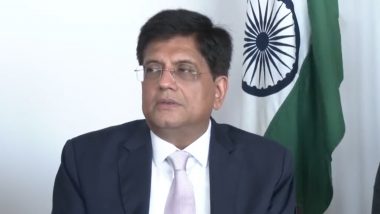Geneva, June 14: Union Commerce and Industry Minister Piyush Goyal on Tuesday called for preserving special and differential treatment at the WTO in dealing with fisheries subsidies saying India cannot compromise on the livelihoods of over 9 million fishermen families.
"I see a lot of countries very concerned about their fishermen. But what are the number of fishermen? One may have 1,500 fishermen, another may have 11,000 fishermen, another has 23,000 fishermen, and yet another 12,000," Goyal said in his intervention on Fisheries Subsidies Negotiation at the 12th World Trade Organisation (WTO) conference here.
"The concern of the small number of fishermen prevails over the livelihood of 9 million fishermen in India. This is completely unacceptable! And that is the reason, India is opposed to the current text, also opposed to the way De minimis is sought to be institutionalised," he said.
Opposing the WTO proposal on fisheries subsidies, Goyal said, "I see in every which way, the Uruguay round asymmetries and discrimination in agriculture being sought to be institutionalised in fishing today." Rajya Sabha Election Results 2022: Piyush Goyal Thanks State BJP Leadership After Winning in Maharashtra.
"I strongly feel that this outcome of the exercise being carried out now, has not provided a level-playing field to the developing nations to address the aspirations of the traditional fishers and their livelihood. Several million fishers, nearly 9 million families in India depend on assistance and support from the Government, albeit very small which I just demonstrated, for their livelihood," he said.
"Any decision not to provide space for small-scale and traditional fishers to expand their capabilities would only rip away their future opportunities," Goyal added. In his intervention on 'Fisheries Subsidies Negotiation' at the WTO, Goyal noted that India's subsidies are one of the lowest.
India, for every fisher family that we have, gives barely $15 in a year to its fishermen families and there are countries here, which give as high as $42,000, $65,000 & $75,000 to one fishermen family. That is the extent of disparity that is sought to be institutionalised, through the current fisheries text, he said.
"India's fisheries sector is traditional and small-scale in nature and we are essentially one of the disciplined nations in sustainably harnessing the fisheries resources," he added. Fish is an inseparable part of Indian mythology, religion and culture. India's engagement in the sustainable harnessing of its fish and aquatic resources has always been exemplary, he said.
"The traditional fishers' life in India has been intertwined with the oceans and seas since times immemorial. Fish is the only source of their livelihood over generations; responsible and sustainable fishing is ingrained in the ethos of our fishers," the minister said.
"Our traditional fishers toil under harsh and extreme conditions to bring the highly delicious and nutritious fish protein to our plates and to the plates of many other countries," he added.
(The above story is verified and authored by ANI staff, ANI is South Asia's leading multimedia news agency with over 100 bureaus in India, South Asia and across the globe. ANI brings the latest news on Politics and Current Affairs in India & around the World, Sports, Health, Fitness, Entertainment, & News. The views appearing in the above post do not reflect the opinions of LatestLY)













 Quickly
Quickly


